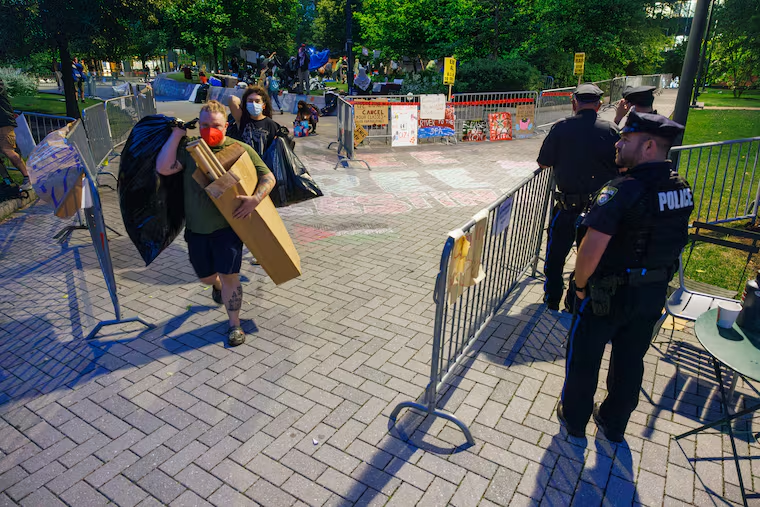Pro-Palestinian encampment is cleared at Drexel University
By 5:20 a.m, dozens of police officers on bikes arrived at the Korman Family Quad, as protesters hustled to gather their belongings.

After dozens of Philadelphia police officers arrived at the scene on bikes just before dawn on Thursday, pro-Palestinian protesters abandoned their encampment on the Drexel University campus, evidently without incident or arrests.
The protesters quickly packed up their belongings — including multiple coolers, trash bags, and backpacks — after the officers showed up at the Korman Family Quad about 5:20 a.m. Within 25 minutes, a few folding chairs and tables, a plant, cardboard boxes, and bags were all that was left of what had been a 35-tent encampment.
“Protesters complied with police warnings to disperse peacefully,” Drexel president John A. Fry — who called the group’s demands “repugnant” and “antisemitic” — said in a statement Thursday morning.
In an Instagram post, encampment organizers countered that they had executed a planned “strategic retreat.”
Some of those who left the camp gathered briefly on the corner of 33rd and Market Streets, and a small crowd walked on 33rd Street hoisting a Palestinian flag and chanting “Free, free Palestine.”
“For now, the encampment is closed,” an organizer told The Inquirer, but otherwise protesters declined comment.
“This was a difficult decision, but protesters left us no other choice,” Fry said in a statement Thursday morning.
Drexel police had issued an order for the encampment to disband, and city police were on site to assist in enforcing the order, according to Philadelphia Police Sgt. Eric Gripp. ”The campers picked up their belongings for the most part and left by their own free will,” Gripp said.
According to Fry’s statement, both Drexel security officers and city police were at the scene Thursday morning.
”While Drexel University is committed to protecting the right of its community members to assemble peacefully and express their views,” Fry said in the statement. “I have the responsibility and authority to regulate campus gatherings in order to ensure everyone’s safety and well-being and to fulfill our mission to educate our students.”
He said the encampment included a substantial number of protesters who were not affiliated with Drexel.
Protesters demanded that Drexel call Israel’s siege in Gaza a genocide and offer amnesty for student activists. The protesters also were calling for the termination of Drexel’s Hillel and Chabad, two Jewish campus organizations for students, according to their Instagram posts
In his statement, Fry cited the Instagram post and said that the protesters had harassed passersby and repeatedly “verbally abused our public safety officers.” He called the group’s demands, which also included cutting ties with a Jewish faculty member and a Jewish member of a Drexel advisory board, “repugnant” and “antisemitic.”
The encampment was the latest in a wave of campus protests in the United States that are calling on universities to publicize their endowments and divest them from corporations profiting off the war.
The encampment began on Saturday with about a dozen tents that protesters set up on the Korman Quad after a march from Center City commemorating the 76th anniversary of the Nakba, when Palestinians were expelled from Israel. It then grew to contain about 35 tents and 75 people.
“I expect to receive criticism from those who will argue that deploying police officers to end a protest encampment is both a disproportionate response to a nonviolent campus protest and a violation of the rights of individuals to express their views freely and to protest,” Fry wrote. “I respectfully disagree.”
Meanwhile, about a mile west of the campus, no signs of protest were evident at Clark Park, where a cluster of tents in support of Gaza had appeared Wednesday, and Parks on Tap, the city’s traveling beer garden, was set up for another night.
Inquirer staff writer Zoe Greenberg contributed to this article.